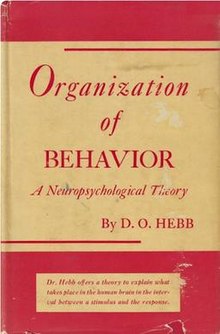393:
27:
430:
175:
196:
423:
284:
102:
252:
454:
136:
469:
459:
449:
416:
464:
147:. According to Webster, the hypothesis has classic status within science and is supported by recent research.
337:
342:
332:
277:
347:
375:
370:
365:
124:
119:. One of the main takeaways was that it proposed a theory about learning based on conjunctures on
26:
270:
248:
171:
97:
400:
357:
181:
144:
392:
165:
120:
116:
40:
443:
314:
309:
81:
77:
324:
301:
293:
58:
266:
262:
167:
404:
197:"A Very Short History Of Artificial Intelligence (AI)"
125:
synapses being able to strengthen or weaken over time
245:
356:
323:
300:
96:
88:
72:
64:
54:
46:
36:
424:
278:
8:
19:
399:This article about a non-fiction book is a
431:
417:
285:
271:
263:
25:
18:
220:
156:
7:
389:
387:
143:as the most influential outline of
115:is a 1949 book by the psychologist
92:378 (2002 Psychology Press edition)
403:. You can help Knowledge (XXG) by
14:
391:
195:Press, Gil (30 December 2016).
1:
20:The Organization of Behavior
247:. Oxford: The Orwell Press.
170:. New York: Wiley and Sons.
16:1949 book by Donald O. Hebb
486:
386:
31:Cover of the first edition
243:Webster, Richard (2005).
24:
302:Non-associative learning
141:Organization of Behavior
112:Organization of Behavior
455:Books by Donald O. Hebb
470:Non-fiction book stubs
460:English-language books
450:1949 non-fiction books
343:Observational learning
333:Classical conditioning
348:Operant conditioning
325:Associative learning
164:Hebb, D. O. (1949).
376:Inductive reasoning
371:Deductive reasoning
366:Abductive reasoning
21:
465:Neuroscience books
412:
411:
384:
383:
177:978-0-471-36727-7
108:
107:
477:
433:
426:
419:
395:
388:
358:Insight learning
287:
280:
273:
264:
258:
224:
218:
212:
211:
209:
207:
192:
186:
185:
182:Internet Archive
161:
145:Hebb's postulate
29:
22:
485:
484:
480:
479:
478:
476:
475:
474:
440:
439:
438:
437:
385:
380:
352:
319:
296:
291:
261:
255:
242:
233:
228:
227:
219:
215:
205:
203:
194:
193:
189:
178:
163:
162:
158:
153:
137:Richard Webster
133:
121:neural networks
73:Media type
32:
17:
12:
11:
5:
483:
481:
473:
472:
467:
462:
457:
452:
442:
441:
436:
435:
428:
421:
413:
410:
409:
396:
382:
381:
379:
378:
373:
368:
362:
360:
354:
353:
351:
350:
345:
340:
335:
329:
327:
321:
320:
318:
317:
312:
306:
304:
298:
297:
292:
290:
289:
282:
275:
267:
260:
259:
253:
239:
238:
237:
232:
229:
226:
225:
223:, p. 487.
213:
187:
176:
155:
154:
152:
149:
132:
129:
117:Donald O. Hebb
106:
105:
103:978-0805843002
100:
94:
93:
90:
86:
85:
74:
70:
69:
66:
62:
61:
56:
52:
51:
48:
44:
43:
41:Donald O. Hebb
38:
34:
33:
30:
15:
13:
10:
9:
6:
4:
3:
2:
482:
471:
468:
466:
463:
461:
458:
456:
453:
451:
448:
447:
445:
434:
429:
427:
422:
420:
415:
414:
408:
406:
402:
397:
394:
390:
377:
374:
372:
369:
367:
364:
363:
361:
359:
355:
349:
346:
344:
341:
339:
336:
334:
331:
330:
328:
326:
322:
316:
315:Sensitization
313:
311:
308:
307:
305:
303:
299:
295:
288:
283:
281:
276:
274:
269:
268:
265:
256:
254:0-9515922-5-4
250:
246:
241:
240:
235:
234:
230:
222:
217:
214:
202:
198:
191:
188:
183:
179:
173:
169:
168:
160:
157:
150:
148:
146:
142:
138:
130:
128:
126:
122:
118:
114:
113:
104:
101:
99:
95:
91:
87:
83:
79:
75:
71:
67:
63:
60:
57:
53:
49:
45:
42:
39:
35:
28:
23:
405:expanding it
398:
244:
231:Bibliography
221:Webster 2005
216:
204:. Retrieved
200:
190:
180:– via
166:
159:
140:
134:
111:
110:
109:
310:Habituation
139:identifies
135:The author
444:Categories
338:Imprinting
151:References
206:11 August
131:Reception
82:Paperback
78:Hardcover
65:Published
294:Learning
59:Learning
47:Language
76:Print (
55:Subject
50:English
251:
201:Forbes
174:
37:Author
236:Books
123:and
89:Pages
401:stub
249:ISBN
208:2024
172:ISBN
98:ISBN
80:and
68:1949
446::
199:.
127:.
432:e
425:t
418:v
407:.
286:e
279:t
272:v
257:.
210:.
184:.
84:)
Text is available under the Creative Commons Attribution-ShareAlike License. Additional terms may apply.
